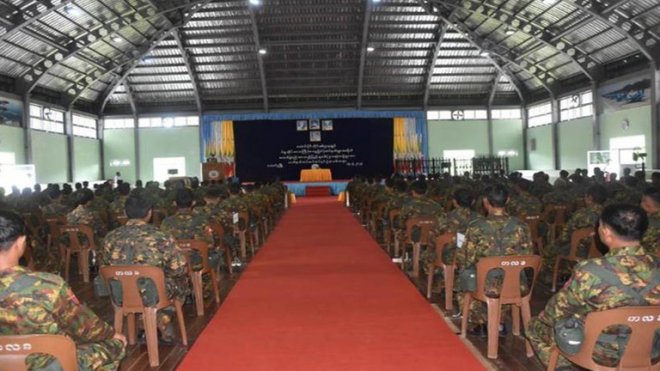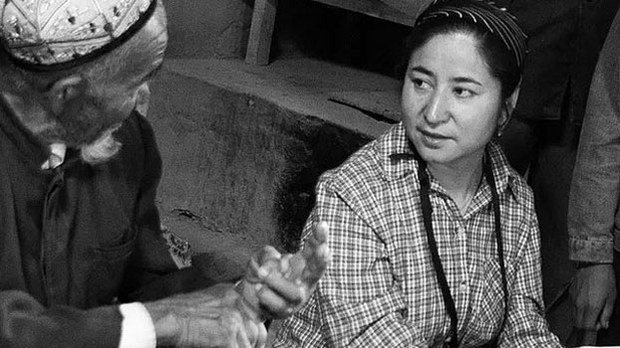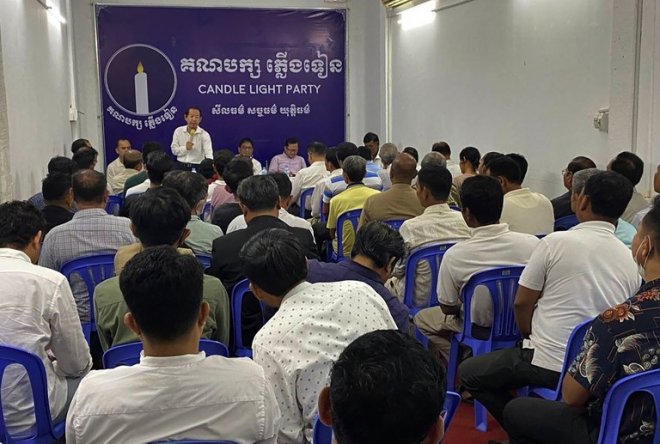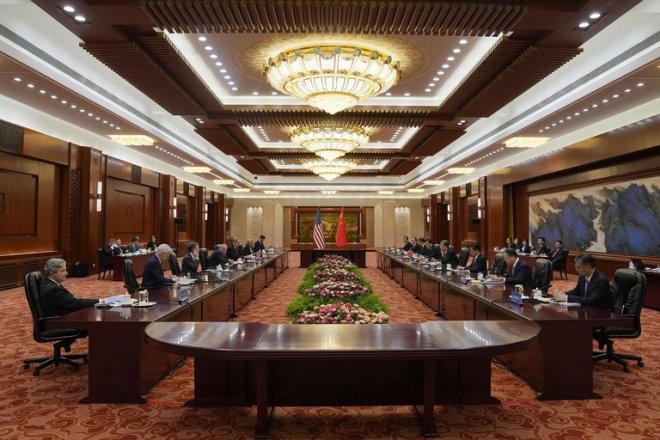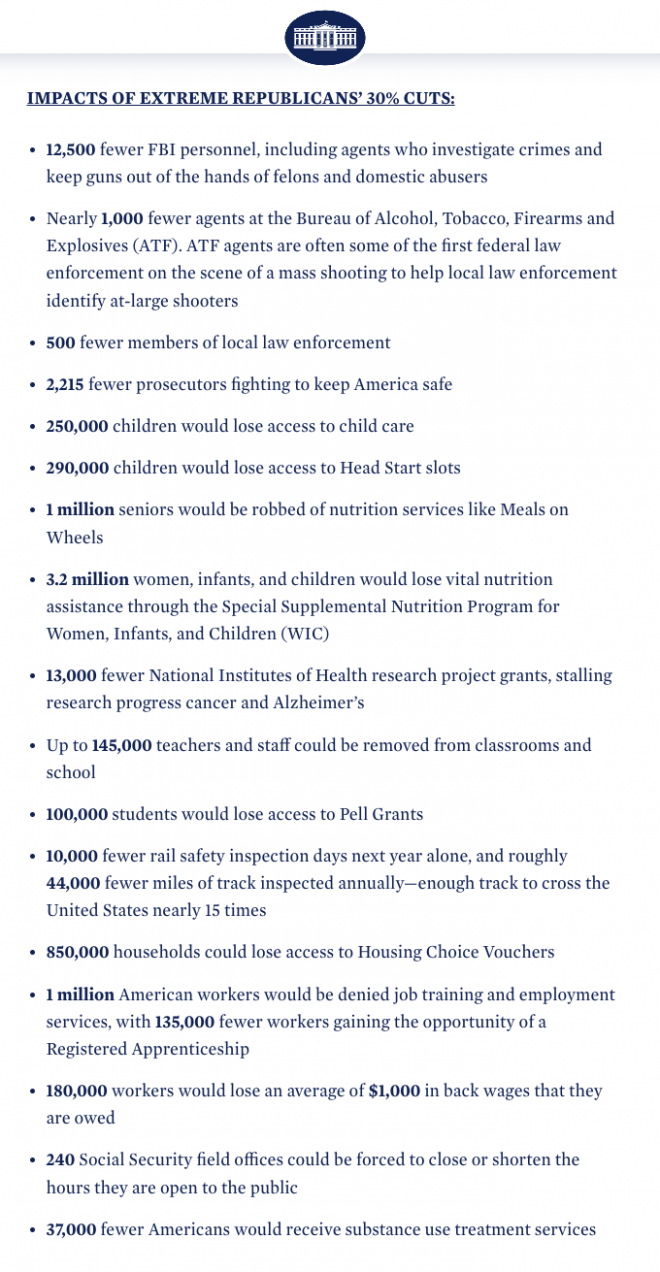Chinese universities send students home en masse after weekend protests
Chinese authorities on Monday appeared to be moving to frame a wave of nationwide anti-lockdown protests at the weekend as the work of "hostile foreign forces," with university students ordered to leave campus and go back to their hometowns aboard specially arranged train services, state media and a university source said on Monday.
Tsinghua University, where thousands of students gathered in protest on Sunday following a deadly apartment block fire in the Xinjiang regional capital of Urumqi on Nov. 24 that many blamed on stringent COVID-19 lockdown measures, is offering free bus services for students to all major Beijing railway stations and airports so they can return to their hometowns, the English-language Global Times newspaper reported on Monday.
Similar measures are under way at the University of International Business and Economics and the Chinese Academy of Sciences to "help students return home," the paper reported.
University sources in Shanghai and Sichuan told Radio Free Asia that the Ministry of Education had convened an emergency meeting of hundreds of ruling Chinese Communist Party secretaries and college principals across the country, calling on them to counter "interference by foreign forces," after spontaneous protests on city streets and university campuses in over a dozen cities over the weekend.
All colleges and universities must do a good job of "ideological work" with students and take strict measures to prevent students from "colluding" with foreign forces, or foreign forces from "interfering," the colleges were told.
"The university leaders, mostly Communist Party secretaries, from universities all around the country were called in for an emergency meeting on Sunday afternoon, and temporary control measures have been deployed, with students told to go home early," a graduate of Fudan University"s journalism faculty told RFA on Monday.
![]() People hold white sheets of paper in protest over coronavirus disease (COVID-19) restrictions after a vigil for the victims of a fire in Urumqi, as outbreaks of COVID-19 continue, in Beijing, China, November 28, 2022. REUTERS/Thomas Peter
People hold white sheets of paper in protest over coronavirus disease (COVID-19) restrictions after a vigil for the victims of a fire in Urumqi, as outbreaks of COVID-19 continue, in Beijing, China, November 28, 2022. REUTERS/Thomas Peter
"The protests were particularly loud at Tsinghua University, but campuses across the country were pretty quiet again by the early hours [of Monday morning]," the person said.
"A lot of people here in Shanghai took part spontaneously yesterday," they said.
Chinese Foreign Ministry spokesman Zhao Lijian on Monday hit out at "forces with ulterior motives who linked the fire with disease control and prevention," while state news agency Xinhua said in an indirect reference to the protests that the zero-COVID policy is facing "unprecedented pressure," and called for its "unswerving" implementation.
Blank sheets of paper
In Beijing"s Liangmaqiao area, protesters who held up blank sheets of paper to protest curbs on freedom of expression didn"t disperse until the early hours of Monday, according to video footage posted by a Twitter user with the handle "Ms. Li is not your teacher."
In one video clip, students said they had been warned by university officials that there were "anti-China foreign forces" at work in the protests, prompting some people to shout out in response: "When you say foreign forces, are you talking about Marx and Engels?" in a reference to two of the pillars of Communist Party ideology.
"Was the fire in Xinjiang set by foreign forces? Was the Guizhou [quarantine] bus overturned by foreign forces?” shouts one voice. "We can’t even access the internet! How is that to do with foreign forces? The only forces stopping us from gathering come from within our own territory!"
![]() Protesters march along a street during a rally for the victims of a deadly fire as well as a protest against China"s harsh Covid-19 restrictions in Beijing on November 28, 2022. (Photo by Noel CELIS / AFP)
Protesters march along a street during a rally for the victims of a deadly fire as well as a protest against China"s harsh Covid-19 restrictions in Beijing on November 28, 2022. (Photo by Noel CELIS / AFP)
Clips showed a strong police presence, with officers starting to detain people in the middle of the night, and "kettling" the crowd into smaller sections to force them to leave.
The Global Times said in a separate article, citing pro-government commentators, that "due to ideological differences, it has become almost an instinct of Western countries and media to criticize communist governments with an aim to subvert the latter with color revolutions."
"Some forces in the U.S. and other Western countries can"t accept that China has the capacity to adjust its policy in a more flexible way and contain the virus," it quoted "observers" as saying.
In another article, the paper said the Health Ministry had dispatched working groups to ensure local governments aren"t using harsher restrictions than required by the zero-COVID policy, "to rectify some problems" that have emerged with disease control and prevention efforts.
‘The whole thing could explode’
A retired government official surnamed Li currently living in Beijing said the authorities are afraid students will start a much more coordinated movement.
"There is a huge sense of public grievance right now, and the Tsinghua University students are up in arms," Li said. "Students are protesting, and scholars are already mobilizing."
"Hundreds of students at Tsinghua held up signs calling for freedom, and we saw similar signs on Urumqi Road in Shanghai and also in Shenzhen," Li said. "It"s happening everywhere, and students from all over the country [are likely to connect their protests], while residential communities are rising up too."
"If they mishandle this, the whole thing could explode, because regular people can"t carry on like this; they may as well fight," Li said.
‘The right to breathe’
Feng Han, a retired scholar from Guizhou University who lived through the student movement of 1989, said the struggle is an existential one, rather than an ideological one.
"These [protests] are about the right to breathe, to eat, to live, to enjoy human rights and freedom, not PCR tests," Feng said. "In that sense, they are anti-authoritarian, anti-repression and anti-dictatorship."
"[Zero-COVID] has been going on for three years, and a lot of people can"t even get food to eat [during lockdowns]," Feng said. "If people can"t carry on a basic existence, can"t work or live their lives in a normal manner, then there are going to be problems."
![]() People gather for a vigil and hold white sheets of paper in protest over coronavirus disease (COVID-19) restrictions, during a commemoration of the victims of a fire in Urumqi, as outbreaks of COVID-19 continue, in Beijing, China, November 27, 2022. REUTERS/ThomasHong Kong current affairs commentator Johnny Lau said the protests have yet to become nationwide in focus.
People gather for a vigil and hold white sheets of paper in protest over coronavirus disease (COVID-19) restrictions, during a commemoration of the victims of a fire in Urumqi, as outbreaks of COVID-19 continue, in Beijing, China, November 27, 2022. REUTERS/ThomasHong Kong current affairs commentator Johnny Lau said the protests have yet to become nationwide in focus.
"We"re not at the point of nationwide protests yet, and it remains to be seen if the authorities will make adjustments before that critical point is reached," Lau told RFA.
"If the government acts in a timely manner, that critical point won"t be reached soon ... These are sporadic protests that are making the government nervous," he said.
Beijing-based political commentator Si Ling said the government is unlikely to ease back on the zero-COVID policy, however.
"If the Chinese government announces the end of zero-COVID just because of popular protest, then it will give the impression that democratic protests are effective in influencing its decision-making," Si told RFA.
"That will spark further protests from the public ... so they can"t afford to give any breathing room to street protests and demonstrations whatsoever," he said. "It will also look as if the entire zero-COVID policy was totally wrong, and a waste of money and people."
"That is something that Xi Jinping will never allow, because for him, the most important thing is to preserve his ... authority, continuity and effectiveness within the central leadership system," Si said.
Former 1989 student leader Wang Dan said a strategic lull in protests would be a good thing.
"The struggle is long-term, and there must be a rhythm," Wang told RFA. "Based on our experience back then, we didn"t do a good job at this point. We should have advanced and then retreated, so as to advance again another time."
"Don"t try to tear everything down all at once like we did in 1989."
Translated and edited by Luisetta Mudie. Edited by Malcolm Foster.
[圖擷取自網路,如有疑問請私訊]
Tsinghua University, where thousands of students gathered in protest on Sunday following a deadly apartment block fire in the Xinjiang regional capital of Urumqi on Nov. 24 that many blamed on stringent COVID-19 lockdown measures, is offering free bus services for students to all major Beijing railway stations and airports so they can return to their hometowns, the English-language Global Times newspaper reported on Monday.
Similar measures are under way at the University of International Business and Economics and the Chinese Academy of Sciences to "help students return home," the paper reported.
University sources in Shanghai and Sichuan told Radio Free Asia that the Ministry of Education had convened an emergency meeting of hundreds of ruling Chinese Communist Party secretaries and college principals across the country, calling on them to counter "interference by foreign forces," after spontaneous protests on city streets and university campuses in over a dozen cities over the weekend.
All colleges and universities must do a good job of "ideological work" with students and take strict measures to prevent students from "colluding" with foreign forces, or foreign forces from "interfering," the colleges were told.
"The university leaders, mostly Communist Party secretaries, from universities all around the country were called in for an emergency meeting on Sunday afternoon, and temporary control measures have been deployed, with students told to go home early," a graduate of Fudan University"s journalism faculty told RFA on Monday.
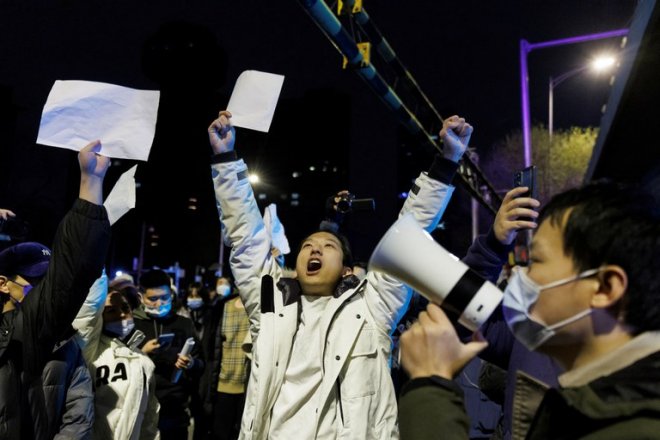 People hold white sheets of paper in protest over coronavirus disease (COVID-19) restrictions after a vigil for the victims of a fire in Urumqi, as outbreaks of COVID-19 continue, in Beijing, China, November 28, 2022. REUTERS/Thomas Peter
People hold white sheets of paper in protest over coronavirus disease (COVID-19) restrictions after a vigil for the victims of a fire in Urumqi, as outbreaks of COVID-19 continue, in Beijing, China, November 28, 2022. REUTERS/Thomas Peter"The protests were particularly loud at Tsinghua University, but campuses across the country were pretty quiet again by the early hours [of Monday morning]," the person said.
"A lot of people here in Shanghai took part spontaneously yesterday," they said.
Chinese Foreign Ministry spokesman Zhao Lijian on Monday hit out at "forces with ulterior motives who linked the fire with disease control and prevention," while state news agency Xinhua said in an indirect reference to the protests that the zero-COVID policy is facing "unprecedented pressure," and called for its "unswerving" implementation.
Blank sheets of paper
In Beijing"s Liangmaqiao area, protesters who held up blank sheets of paper to protest curbs on freedom of expression didn"t disperse until the early hours of Monday, according to video footage posted by a Twitter user with the handle "Ms. Li is not your teacher."
In one video clip, students said they had been warned by university officials that there were "anti-China foreign forces" at work in the protests, prompting some people to shout out in response: "When you say foreign forces, are you talking about Marx and Engels?" in a reference to two of the pillars of Communist Party ideology.
"Was the fire in Xinjiang set by foreign forces? Was the Guizhou [quarantine] bus overturned by foreign forces?” shouts one voice. "We can’t even access the internet! How is that to do with foreign forces? The only forces stopping us from gathering come from within our own territory!"
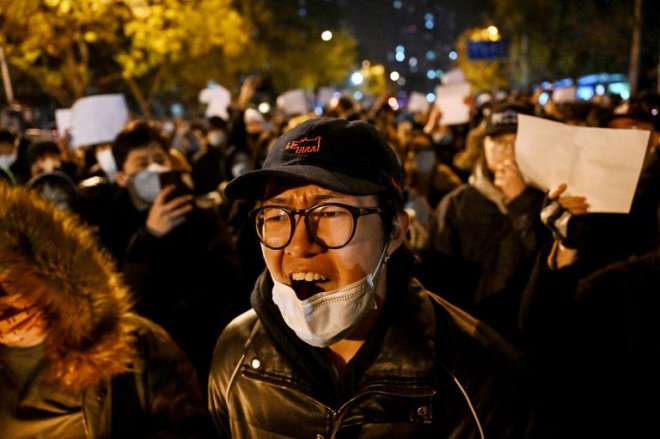 Protesters march along a street during a rally for the victims of a deadly fire as well as a protest against China"s harsh Covid-19 restrictions in Beijing on November 28, 2022. (Photo by Noel CELIS / AFP)
Protesters march along a street during a rally for the victims of a deadly fire as well as a protest against China"s harsh Covid-19 restrictions in Beijing on November 28, 2022. (Photo by Noel CELIS / AFP)Clips showed a strong police presence, with officers starting to detain people in the middle of the night, and "kettling" the crowd into smaller sections to force them to leave.
The Global Times said in a separate article, citing pro-government commentators, that "due to ideological differences, it has become almost an instinct of Western countries and media to criticize communist governments with an aim to subvert the latter with color revolutions."
"Some forces in the U.S. and other Western countries can"t accept that China has the capacity to adjust its policy in a more flexible way and contain the virus," it quoted "observers" as saying.
In another article, the paper said the Health Ministry had dispatched working groups to ensure local governments aren"t using harsher restrictions than required by the zero-COVID policy, "to rectify some problems" that have emerged with disease control and prevention efforts.
‘The whole thing could explode’
A retired government official surnamed Li currently living in Beijing said the authorities are afraid students will start a much more coordinated movement.
"There is a huge sense of public grievance right now, and the Tsinghua University students are up in arms," Li said. "Students are protesting, and scholars are already mobilizing."
"Hundreds of students at Tsinghua held up signs calling for freedom, and we saw similar signs on Urumqi Road in Shanghai and also in Shenzhen," Li said. "It"s happening everywhere, and students from all over the country [are likely to connect their protests], while residential communities are rising up too."
"If they mishandle this, the whole thing could explode, because regular people can"t carry on like this; they may as well fight," Li said.
‘The right to breathe’
Feng Han, a retired scholar from Guizhou University who lived through the student movement of 1989, said the struggle is an existential one, rather than an ideological one.
"These [protests] are about the right to breathe, to eat, to live, to enjoy human rights and freedom, not PCR tests," Feng said. "In that sense, they are anti-authoritarian, anti-repression and anti-dictatorship."
"[Zero-COVID] has been going on for three years, and a lot of people can"t even get food to eat [during lockdowns]," Feng said. "If people can"t carry on a basic existence, can"t work or live their lives in a normal manner, then there are going to be problems."
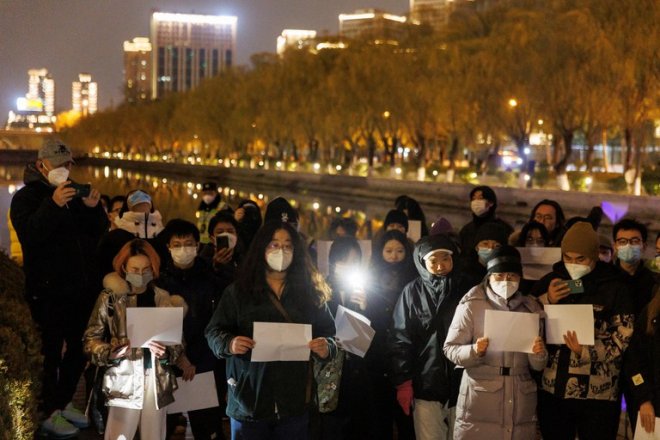 People gather for a vigil and hold white sheets of paper in protest over coronavirus disease (COVID-19) restrictions, during a commemoration of the victims of a fire in Urumqi, as outbreaks of COVID-19 continue, in Beijing, China, November 27, 2022. REUTERS/ThomasHong Kong current affairs commentator Johnny Lau said the protests have yet to become nationwide in focus.
People gather for a vigil and hold white sheets of paper in protest over coronavirus disease (COVID-19) restrictions, during a commemoration of the victims of a fire in Urumqi, as outbreaks of COVID-19 continue, in Beijing, China, November 27, 2022. REUTERS/ThomasHong Kong current affairs commentator Johnny Lau said the protests have yet to become nationwide in focus."We"re not at the point of nationwide protests yet, and it remains to be seen if the authorities will make adjustments before that critical point is reached," Lau told RFA.
"If the government acts in a timely manner, that critical point won"t be reached soon ... These are sporadic protests that are making the government nervous," he said.
Beijing-based political commentator Si Ling said the government is unlikely to ease back on the zero-COVID policy, however.
"If the Chinese government announces the end of zero-COVID just because of popular protest, then it will give the impression that democratic protests are effective in influencing its decision-making," Si told RFA.
"That will spark further protests from the public ... so they can"t afford to give any breathing room to street protests and demonstrations whatsoever," he said. "It will also look as if the entire zero-COVID policy was totally wrong, and a waste of money and people."
"That is something that Xi Jinping will never allow, because for him, the most important thing is to preserve his ... authority, continuity and effectiveness within the central leadership system," Si said.
Former 1989 student leader Wang Dan said a strategic lull in protests would be a good thing.
"The struggle is long-term, and there must be a rhythm," Wang told RFA. "Based on our experience back then, we didn"t do a good job at this point. We should have advanced and then retreated, so as to advance again another time."
"Don"t try to tear everything down all at once like we did in 1989."
Translated and edited by Luisetta Mudie. Edited by Malcolm Foster.
[圖擷取自網路,如有疑問請私訊]
|
本篇 |
不想錯過? 請追蹤FB專頁! |
| 喜歡這篇嗎?快分享吧! |
相關文章
AsianNewsCast








